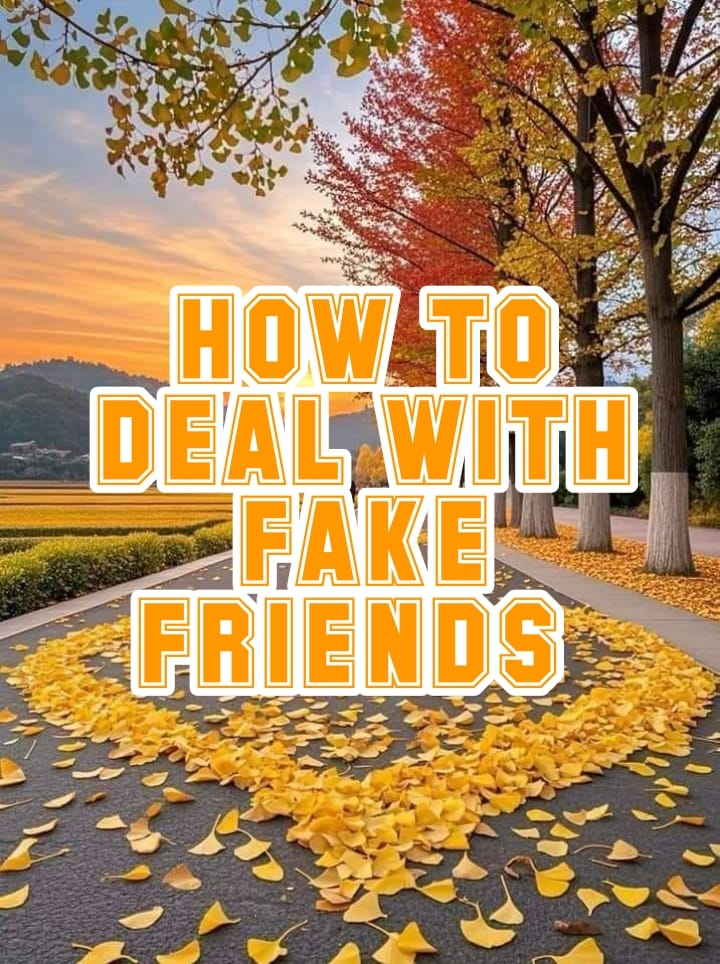
Dealing with fake friends—those who only show up when things are going well for you or when they stand to benefit—can be really hurtful, but also an opportunity for growth. Here’s some advice on how to handle these types of friendships:

1. Recognize the Signs Early
- Inconsistent Support: They’re only around when things are easy or when you’re in a good mood. But when you’re struggling or facing challenges, they either disappear or don’t offer much real support.
- Self-Centeredness: Fake friends often make everything about themselves. If you’re going through something difficult, they might turn the conversation back to their own issues or act indifferent.
- Conditional Friendship: Their friendship feels like it’s based on what you can offer them, rather than mutual respect or affection. When you’re no longer “useful” or in a vulnerable state, they may back off.
2. Don’t Take It Personally
- The behavior of fake friends often says more about them than it does about you. People who only show up in good times often struggle with empathy or have their own insecurities, and their actions reflect their lack of emotional maturity or depth.
- Understand that you deserve friends who are there for you in both the highs and lows. If they can’t be there during the hard times, they aren’t truly your friend.
3. Set Boundaries
- Limit Your Emotional Investment: If you notice a pattern of behavior where someone is only there when you’re doing well, start protecting your emotional energy. Invest less in them emotionally and recognize that their role in your life might need to be reassessed.
- Be Clear: If you feel comfortable, have an honest conversation. Let them know that you value genuine friendships where support goes both ways. This might help them reflect on their actions, or it may show you that they aren’t willing to change.
4. Cultivate Genuine Relationships
- Quality Over Quantity: Surround yourself with people who support you through thick and thin, not just when it’s convenient. True friendships are built on mutual trust, care, and respect.
- Value Authentic Connections: Look for friends who are present when things are tough, who show empathy, and who offer help without expecting anything in return.
5. Don’t Be Afraid to Let Go
- If someone consistently shows they’re a fair-weather friend, it might be time to distance yourself. You don’t owe anyone a place in your life, especially if they aren’t contributing positively to your well-being.
- Letting go of fake friends can feel lonely at first, but it often opens the door to more fulfilling, meaningful relationships.
6. Learn from the Experience
- Fake friends can teach you valuable lessons about yourself and what you need in a friend. Use this experience to develop better boundaries, recognize red flags earlier, and appreciate the genuine people in your life.
7. Focus on Self-Love
- True friends are a reflection of the energy and love you put into yourself. When you have confidence and value yourself, it becomes easier to recognize when someone isn’t treating you with the respect you deserve. Cultivating self-love helps you attract people who align with your true worth.
Final Thought:
Friendships should be a source of comfort, joy, and support. Fake friends often drain your energy, leaving you questioning your self-worth. But by recognizing these dynamics and choosing to prioritize people who genuinely care about you, you create space for real, lasting connections that help you grow and thrive.

Support Our Website!
We appreciate your visit and hope you find our content valuable. If you’d like to support us further, please consider contributing through the TILL NUMBER: 9549825. Your support helps us keep delivering great content!
Thank you for your generosity!
